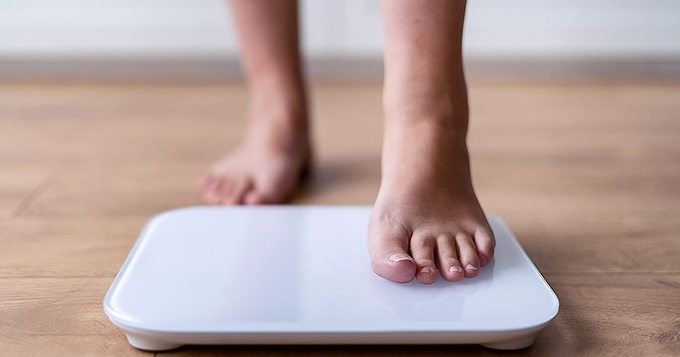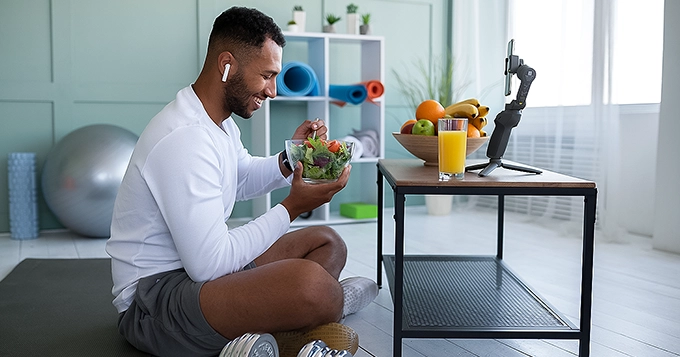Instead of focusing solely on nutrients and counting your calorie intake, scientists are looking at meal timing and discovering that it can have striking effects on your weight, chronic disease risk, appetite, and your body’s ability to store and burn fat.
So, how often and when are the best times to eat to lose weight? These would likely differ by individual, but there are some general recommendations for meal timing.
Eat a bigger breakfast and a small dinner.
The timing of your meals plays a crucial role in your metabolic health, though it’s challenging for some, like night-shift workers, to avoid late-night eating. However, for those with flexible schedules, research suggests that having the largest meal earlier in the day may be advantageous.
A recent study in Obesity Reviews analyzed data from nine clinical trials with 485 adults, revealing that those who consumed most calories earlier in the day experienced more significant weight loss. Additionally, they showed improvements in blood sugar, cholesterol, and insulin sensitivity, a key marker for diabetes risk.
Another study, published in Cell Metabolism, investigated adults following an early eating schedule (8 a.m. breakfast, noon lunch, 4 p.m. dinner) for six days. In comparison, a late-eating schedule (each meal shifted four hours later) was tested on the same participants. Although small, the study, conducted in a controlled laboratory setting with 16 closely monitored individuals, provided insight into the potential benefits of an earlier eating pattern. Benefits include better weight management, aligning eating with your circadian rhythm, and improving your metabolism.
The best time to eat breakfast for weight loss.
Everyone undergoes a nightly “fast” during sleep, and a minimum 12-hour gap between dinner and the next day’s first meal offers various health benefits, such as decreased inflammation, enhanced cellular function, reduced stress, and a healthier gut, according to a 2019 review in Nutrients.
A 12-hour gap can be achieved in different ways. For instance, concluding dinner by 7 p.m. and having breakfast at 7 a.m. the next day, or if you prefer intermittent fasting or skipping breakfast, finishing dinner by 7 p.m. and delaying your first meal until after 11 a.m.
The key takeaway is that weight loss can be achieved through both regular breakfast consumption and intermittent fasting with breakfast omission.
However, two important considerations apply. Firstly, ensure a minimum 12-hour break between dinner and the subsequent meal. Secondly, whether you eat your first meal at 7 a.m. or 11 a.m., make it substantial and rich in nutrients.
The best time to eat lunch for weight loss.
Knowing when to eat lunch has minimal impact on weight loss. However, what stands out about lunch is the recommendation for it to be a substantial meal alongside breakfast (if you opt for breakfast).
This advice aligns with the body’s circadian rhythms, which enhance the efficiency of processes like digestion, burning calories, and regulating hormones earlier in the day.
Considering that food serves as fuel for our bodies, prioritizing most daily calories and nutrients by early afternoon makes practical and biological sense. This approach ensures that you have the necessary energy during the day when you’re most active and require optimal brain function.
The best time to eat dinner for weight loss
According to scientific findings, the best eating times for dinner concerning weight loss is earlier in the evening, ideally around 5 p.m. This, similar to eating a big lunch, also aligns with the body’s circadian rhythms, potentially enhancing weight loss by leveraging the body’s natural processes.
Health professionals and researchers generally agree that it’s optimal to have dinner early, ideally two to three hours before bedtime, and then conclude eating for the night. This practice discourages late-night snacking and allows the body ample time for digestion, promoting more restful sleep later. Going to bed with a full stomach can compromise the quality of sleep, and chronic sleep deprivation may lead to hormonal changes that hinder weight loss.
Furthermore, an early dinner extends the fasting period overnight, promoting increased fat-burning and optimizing the regulation of hormones related to appetite, cravings, and blood sugar. While individual preferences and schedules vary, adjusting the timing of dinner to earlier in the evening may align with the body’s internal clock and support weight loss goals.
The best time to eat before workout
One of the best times to eat to lose weight is before a workout. If you’ve recently had a full meal, waiting for two to three hours before engaging in a workout is ideal. Alternatively, if you’ve had a snack, waiting for approximately half an hour is recommended.
The best time to eat after workout
To support muscle recovery and replenish glycogen stores, consume a meal containing both carbohydrates and protein within two hours of completing your workout. Consider having a snack if your next meal is more than two hours away.









